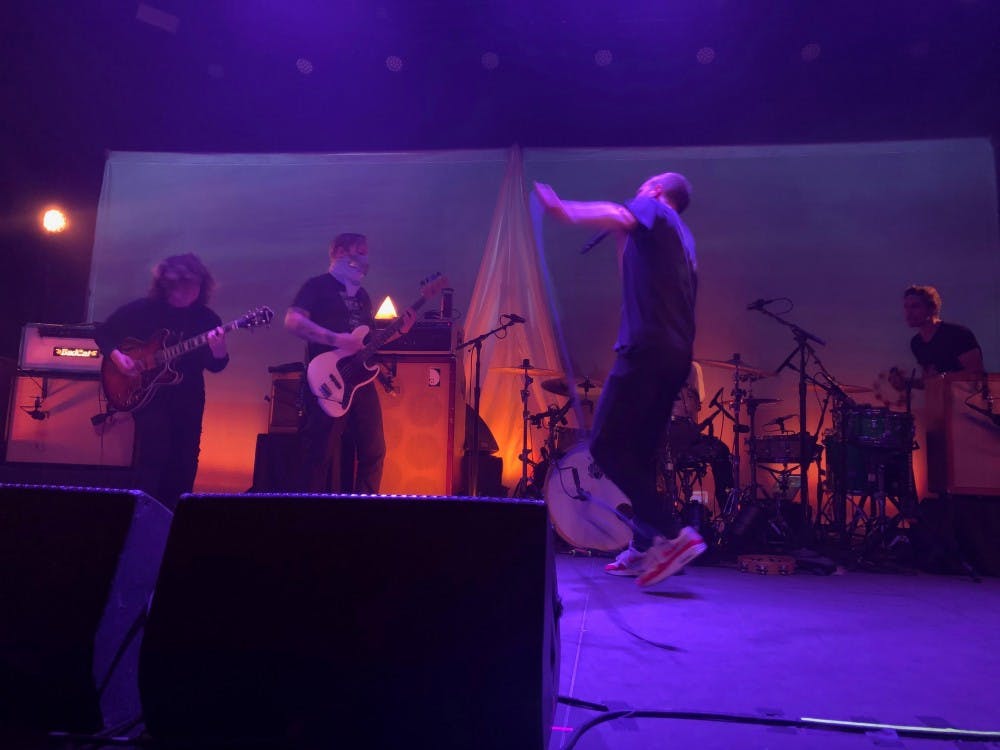Easter Sunday is a strange day for me. It’s the one Sunday that I don’t have to get up early for church, as I always attend the Easter Vigil Mass the night before. I always feel out of place sleeping in until nine or ten in the morning, dressing in a t–shirt and jeans rather than a button–down and khakis, and I need to find a way to fill the lacuna of time I have been awarded. Usually, this comes in the form of a baseball game, but the Phillies were away this weekend. I could have shipped up to the Bronx to see the Yankees or taken a trip down to Camden Yards, but instead I spent the last few hours of Easter at Union Transfer, screaming until my voice was raw to the sounds of La Dispute.
The last time I saw the Grand Rapids post–hardcore band, they were opening for Circa Survive at The Fillmore, and I had no idea what to make of them. The headliner that night was probably the closest that post–hardcore gets to “normal,” with Anthony Green’s countertenor screaming layered over math rock riffs and drum beats. By contrast, La Dispute consisted of hardcore instrumentation and a vocalist who shouted in spoken word, played the tambourine, and liked to spin in circles. Additionally, their fanbase was neither the black leather punk crowd nor the beard and flannel Circa Survive fans, but people who blurred the line between the two, hiding their multicolored hair under a beanie and throwing their scrappy, scrawny bodies into the mosh pit. When they left the stage at The Fillmore, I was confused. By the time they returned to Philly to promote their new LP PANORAMA, I was captivated.

Of the three acts to take the stage on Easter, Slow Mass earned the title of “most chill,” if only because they minimized shouted vocals in favor of fancy guitar riffs and tricks. The charisma of guitarist/vocalist Dave Collis and bassist/vocalist Mercedes Webb overshadowed the sound mix difficulties that left their vocals minimized. What was audible, however, was Collis’ appreciation for Union Transfer, Gritty, and his home city of Philadelphia.
The next opener, Gouge Away, felt like they had been ripped from the Riot Grrrl scene via time machine. Vocalist Christina Michelle resembled a young Kathleen Hanna with her shaggy hair, black and white outfit, and the way that she wailed and threw her body around the stage. She was a woman of constant motion, pacing back and forth like a caged animal even when talking between songs. Behind her, the rest of the band thrashed and thundered their way through the set, leaving the audience no time to breathe.

And then there was La Dispute.
If Gouge Away represented a return to an old era of punk, La Dispute represented a push towards the future. While their opening set list for Circa Survive had been old and familiar material, mostly taken from their debut Somewhere at the Bottom of the River Between Vega and Altair and their third LP Rooms of the House, this show emphasized new release PANORAMA and sophomore effort Wildlife. Most notable, however, was the absence of “King Park,” a seven–minute epic about a 2008 drive–by shooting. The staple encore song was abandoned; as soon as “You and I in Unison” ended, the lights came up and the crowd cleared out.
Just as La Dispute's music alternates between the calm, jazz–influenced spoken word represented by “Woman (in mirror)” and the hardcore shouting of “New Storms for Older Lovers,” vocalist Jordan Dreyer spent his time jumping and stomping around the stage and sweating through his clothes in anger, while also pausing between songs to ask his fans to speak out if they felt uncomfortable and to make sure that this was a safe space for everyone. In fact, WOAR (Philadelphia Center Against Sexual Violence) had a table at the venue with licensed therapists and information available, which was the band’s way of giving back to the community.

Dreyer’s love came through in the sheer energy that he gave to each song and his fan base. Multiple times during the set, Dreyer would catapult himself off the stage and onto the railing, handing the microphone off to fans or high–fiving bold crowd surfers. I was front and center in a Dance Gavin Dance shirt from their show the week before, a show where my contact lens was knocked out and I was repeatedly knocked to the ground by crowd killers, and I was terrified that my location would make me the target of kicks to the head and elbows to the ribs. Instead, when Dreyer threw himself directly in front of me, I reached out without thinking and hugged him around the waist. Dance Gavin Dance was my death, and La Dispute my resurrection.







